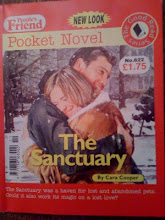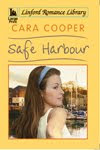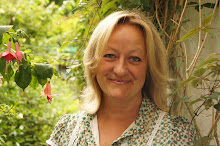

As part of research for a historical novel, I had the fascinating experience recently of going on a guided tour around Knole House in Kent while it was closed for refurbishments. The reason for the tour was to see some marks allegedly made during the 1500s to ward off witches. The house was to be visited by King James, a paranoid monarch (which Monarchs weren't in those times!) who wrote a book on hunting down witches and was responsible for much of the escalation in the persecution of hundreds of men and women.
The day was freezing cold and the whole area, deserted and eerie, extremely atmospheric. The National trust which has preserved the building superbly (though part of it is still lived in by the Sackville family) have been checking electrics and had taken the floorboards up in a room which had been reserved for the King's visit. The mysterious marks like a complex W were placed on a floor board which would have been to the left side of the bed (left being known to be the more sinister direction than the right-hand). It is thought they were scored into the oak beams by the carpenter work in the bedroom that was to be the King's and they have remained hidden all this time. You can see the under floor board marks on the National Trust's website. There were other marks such as circular ones I photographed (see above) in the great hall downstairs carved into a fireplace. Fireplaces were generally reckoned to be weak points where witches could gain access to a dwelling. I also photographed these ones carved into a stone fireplace. The marks were thought to tangle the witches up in the circles and the W's preventing them working their way into the house. Other things that we take for granted today, such as the placing of bay trees either side of a front door were all designed to deter witches.
It is difficult for us to understand such paranoia but there was huge persecution of witches during this time, not least by the self appointed witch finder general, Matthew Hopkins in the next century in England. I will shortly visit East Anglia to trace some of his rather hideous footsteps. The BBC programme 'In our time' with Melvin Bragg has a fascinating programme downloadable from iplayer on how the Reformation affected people's views on witches and led to the old magick which was primarily folklore and herbalism being feared and reviled as the times grew ever more uncertain during the period before, during and after the Civil War.


 As part of research for a historical novel, I had the fascinating experience recently of going on a guided tour around Knole House in Kent while it was closed for refurbishments. The reason for the tour was to see some marks allegedly made during the 1500s to ward off witches. The house was to be visited by King James, a paranoid monarch (which Monarchs weren't in those times!) who wrote a book on hunting down witches and was responsible for much of the escalation in the persecution of hundreds of men and women.
The day was freezing cold and the whole area, deserted and eerie, extremely atmospheric. The National trust which has preserved the building superbly (though part of it is still lived in by the Sackville family) have been checking electrics and had taken the floorboards up in a room which had been reserved for the King's visit. The mysterious marks like a complex W were placed on a floor board which would have been to the left side of the bed (left being known to be the more sinister direction than the right-hand). It is thought they were scored into the oak beams by the carpenter work in the bedroom that was to be the King's and they have remained hidden all this time. You can see the under floor board marks on the National Trust's website. There were other marks such as circular ones I photographed (see above) in the great hall downstairs carved into a fireplace. Fireplaces were generally reckoned to be weak points where witches could gain access to a dwelling. I also photographed these ones carved into a stone fireplace. The marks were thought to tangle the witches up in the circles and the W's preventing them working their way into the house. Other things that we take for granted today, such as the placing of bay trees either side of a front door were all designed to deter witches.
It is difficult for us to understand such paranoia but there was huge persecution of witches during this time, not least by the self appointed witch finder general, Matthew Hopkins in the next century in England. I will shortly visit East Anglia to trace some of his rather hideous footsteps. The BBC programme 'In our time' with Melvin Bragg has a fascinating programme downloadable from iplayer on how the Reformation affected people's views on witches and led to the old magick which was primarily folklore and herbalism being feared and reviled as the times grew ever more uncertain during the period before, during and after the Civil War.
As part of research for a historical novel, I had the fascinating experience recently of going on a guided tour around Knole House in Kent while it was closed for refurbishments. The reason for the tour was to see some marks allegedly made during the 1500s to ward off witches. The house was to be visited by King James, a paranoid monarch (which Monarchs weren't in those times!) who wrote a book on hunting down witches and was responsible for much of the escalation in the persecution of hundreds of men and women.
The day was freezing cold and the whole area, deserted and eerie, extremely atmospheric. The National trust which has preserved the building superbly (though part of it is still lived in by the Sackville family) have been checking electrics and had taken the floorboards up in a room which had been reserved for the King's visit. The mysterious marks like a complex W were placed on a floor board which would have been to the left side of the bed (left being known to be the more sinister direction than the right-hand). It is thought they were scored into the oak beams by the carpenter work in the bedroom that was to be the King's and they have remained hidden all this time. You can see the under floor board marks on the National Trust's website. There were other marks such as circular ones I photographed (see above) in the great hall downstairs carved into a fireplace. Fireplaces were generally reckoned to be weak points where witches could gain access to a dwelling. I also photographed these ones carved into a stone fireplace. The marks were thought to tangle the witches up in the circles and the W's preventing them working their way into the house. Other things that we take for granted today, such as the placing of bay trees either side of a front door were all designed to deter witches.
It is difficult for us to understand such paranoia but there was huge persecution of witches during this time, not least by the self appointed witch finder general, Matthew Hopkins in the next century in England. I will shortly visit East Anglia to trace some of his rather hideous footsteps. The BBC programme 'In our time' with Melvin Bragg has a fascinating programme downloadable from iplayer on how the Reformation affected people's views on witches and led to the old magick which was primarily folklore and herbalism being feared and reviled as the times grew ever more uncertain during the period before, during and after the Civil War.














